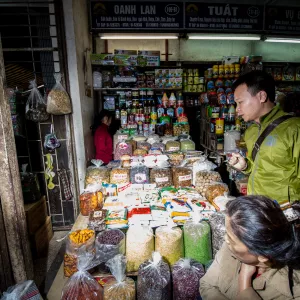SHiFT’s research partner meeting: Highlights from WP2 on MSMEs and the informal sector
In November 2023, the CGIAR Research Initiative on Sustainable Healthy Diets through Food Systems Transformation (SHiFT) held its first research partner meeting to share research findings, evaluate progress, and set goals for the future. Researchers from SHiFT’s Work Package 2 (WP2) discussed their work related to micro, small, and medium enterprises and the informal sector. Understanding the informal sector

SHiFT’s research partner meeting: Highlights from WP2 on MSMEs and the informal sector
In November 2023, the CGIAR Research Initiative on Sustainable Healthy Diets through Food Systems Transformation (SHiFT) held its first research partner meeting to share research findings, evaluate progress, and set goals for the future. Researchers from SHiFT’s Work Package 2 (WP2) discussed their work related to micro, small, and medium enterprises and the informal sector.
Understanding the informal sector
The informal sector plays a vital role in food systems in low– and middle–income countries (LMICs), serving as the bridge between producers and consumers. Micro, small, and medium enterprises (MSMEs) encompass a wide range of actors, including food processors, wholesalers, distributors, and retailers. Decisions made by MSMEs help shape the food environment, influencing the quality of food, snacks, and beverages available to consumers.
WP2 is exploring the dynamics of MSMEs in Viet Nam, Ethiopia, and Bangladesh to inform interventions that will empower these businesses to sell more sustainable, nutritious foods. By analyzing the business environment in which MSMEs work, the types of food they offer and sell, how they obtain those products, and vendors’ nutritional knowledge, WP2 is gaining valuable insight on the challenges and opportunities in selling more sustainable, nutritious foods among MSMEs and the informal sector, as well as their suppliers.
Findings from Viet Nam
Ricardo Hernandez, Agri-food Economist for the Alliance of Bioversity and CIAT, discussed results from a recent survey conducted in Viet Nam that classified food products sold by MSMEs. Convenience stores and coffee/juice/bubble tea shops were found to sell more unhealthy products, while mobile vendors and markets typically sold healthier options.
Francisco Ceballos, Research Fellow at IFPRI, explained that due to the informal nature of MSMEs, many face difficulties accessing finance and business services. He described the types of businesses that can access finance through formal channels, and challenges faced by MSMEs in expansion, by the type of food outlet. Several vendors expressed interest in selling more nutritious foods but lacked the knowledge or resources to do so.
Turning research into action
As WP2 continues to examine MSMEs in SHiFT’s focus countries, they are working with stakeholders to translate their findings into actionable policies. Scalable interventions are crucial for enabling MSMEs to deliver healthier foods while also safeguarding employment opportunities, especially for women and youth. By harnessing the power of MSMEs and the informal sector, WP2 contributes to SHiFT’s goals of transforming food systems, promoting sustainable healthy diets, and improving livelihoods.
Watch the video below to learn more about Work Package 2 from Alan de Brauw.
The International Food Policy Research Institute and the Alliance of Bioversity and CIAT lead SHiFT in close collaboration with Wageningen University and Research and with contributions from the International Potato Center. SHiFT combines high-quality nutritional and social science research capacity with development partnerships to generate innovative, robust solutions that contribute to healthier, more sustainable dietary choices and consumption of sustainable healthy diets. It builds on CGIAR’s unparalleled track record of agricultural research for development, including ten years of work on food systems and nutrition under the CGIAR Research Program on Agriculture for Nutrition and Health (A4NH).
This news item was written by Sydney Honeycutt, Communications Consultant.
Header image: Urban food systems, Viet Nam. Photo by Alliance of Bioversity International from Flickr.

